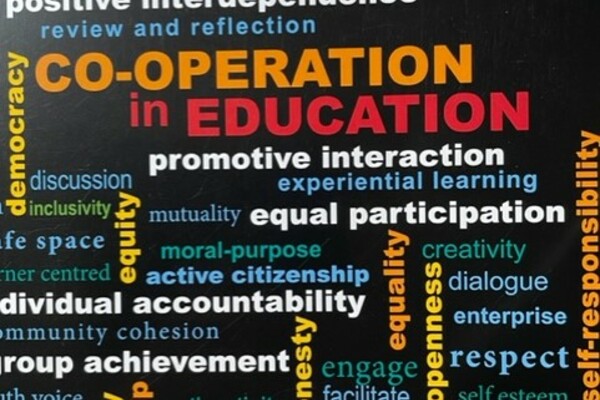Special issue: Co-operation in Education
Guest Editor: Maureen Breeze
Assistant editors: Alan Wilkins and Richard Bickle
The production of this special issue has been a partnership between UKSCS and Co-operative Learning and Development Associates (CLADA - an association of trainers interested in co-operative management; training in participation, co-operation, management of projects, and organisations - registered in 2008 as a community interest company and dissolved in 2014).
Papers
In this special issue, longer papers are interspersed with short articles, case examples, and personal reflections.
Co-operative learning - a contextual framework
Alan Wilkins, pp. 5-14
Co-operative learning (CL) is more complex than might be apparent from an initial impression of a group of learners learning together. This paper attempts to provide a framework by clarifying all the contexts associated with what is currently understood as CL. The historical and philosophical perspectives of Owen, Dewey, Holt and Holmes are introduced to illustrate that our current thinking is not new. Recent contributions by educational thinkers on values, methods and brain science lead to a contemporary account of this pedagogic (educational theory and practice) approach. Related fields of practice are acknowledged (group work, group development, experiential learning and education for enterprise) that all contribute to a fuller interpretation of the wider parameters of CL. The close association with co-operative development as a social movement in the UK is detailed as a distinct contribution to the exploration and provision of CL in this country and abroad. Finally applications to current social and economic concerns (active citizenship, community cohesion, identity and belonging) place CL at the centre of an entitlement for all learners whatever their age. The success of meaningful co-operative educational programmes using diverse CL approaches demands considerable skill and dedication of the educator/facilitator/mediator committed to a belief that places the learner at the heart of all they do in education.
Co-operative learning - values into practice
Nigel Rayment, pp. 15-24
This paper explores some of the implications for co-operative education of the co-operative values published in the International Co-operative Alliance’s 1995 Statement on the Co-operative Identity. It suggests that these values could operate as a framework for those involved in co-operative education to critique and develop the authenticity of their organisation’s enactment of co-operation. It acknowledges that when taken individually none of these values is exclusive to the co-operative movement. It maintains that when the values are understood as a suite and interpreted in the specific context of the co-operative movement’s history and in relation to co-operative practice, they assume a unique quality, which demands a particular attention to authenticity from co-operative educators and
their practice. It asserts that the inclusion of all parties - students, teachers, managers and external stakeholders - in the routine examination and resolution of tensions between co-operative theory and practice is a hallmark of ‘the co-operative education difference’.
A brief view of co-operative learning from across the pond, around the world, and over time
Lynda Baloche, pp. 25-30
Cooperative learning has a long history and a rich and varied research tradition. This article examines historical trends in this research utilising Education Resource Information Center (ERIC) to conduct keyword searches of journal article abstracts plus abstracts reprinted in the Newsletter of the International Association for the Study of Cooperation in Education (IASCE). Trends suggest ongoing interest in teacher education and quality implementation and an emergent focus on the importance of philosophical and cultural context.
Co-operative learning: Making it work in the classroom
Wendy Jolliffe, pp. 31-36, 38-42
This paper will discuss the key factors for effective implementation of Co-operative Learning (CL) in primary and secondary schools. Whilst there is a wealth of existing research into both the benefits and the types of CL, studies into effective implementation are less extensive. The paper will begin with an analysis of existing research into factors in implementing CL. It will then present the context for this research in a network of primary and secondary schools in the North of England. In spite of a background of prescriptive educational context, together with high stakes testing, it will show how this network of schools over a period of five years implemented a very different pedagogy. An analysis of key factors in establishing and maintaining CL in this network are compared with other research findings to ascertain those that translate across cultures. The paper will discuss effective methods of support for a major pedagogical change. It will highlight the importance of a dedicated member of staff, together with the need for a support group across schools, aided by expertise from a Higher Education Institution to help develop and share good practice.
A co-operative learning classroom
Angela Tulloch, p. 37
Little Ones Working Together
Bette Chambers, pp. 43-48.
This article offers guidance to early childhood educators on creating effective co-operative
learning activities for preschoolers. It presents typical characteristics of young children that
inhibit co-operation and those that facilitate it. It outlines the elements specific to implementing co-operative learning with young children, which accommodate these characteristics. It provides sample co-operative activities to promote children’s oral language and social development in nursery and reception.
Through Personal Values to Co-operative Leadership
Andy Packer, p. 49-51, 53-55
This paper is an autoethnography of a head teacher’s influences, motivations and development from his early life to his leadership of a large comprehensive school and to helping shape co-operative ways of working across a community of 21 schools. As such it starts from a very reflective and personal perspective. It then progresses to look at how the writer’s personal values influence aspects of his leadership, including intra-school organisation. Throughout, it draws out the positive influences of co-operative ways of working in educational settings that he has encountered or facilitated. The paper works from the premise that institutional self-interest will not best serve the long term improvement of schools. It argues that this can be achieved through a model of co-operative working where networks of schools are seen as systems with a moral purpose.
Personalised education and co-operation – Connections
Peter Humphreys, p. 52
Co-operation provides opportunities for all - the Reddish Vale Co-operative School a view from a learner
Ashley Simpson, p. 56
Co-operative Schools in the UK
Julie Thorpe, pp. 57-62
An overview of recent developments in the application of a co-operative values-driven approach to the ethos, governance, curriculum and pedagogy of a growing number of schools across England (150+, primary and secondary). What are the threats and opportunities for co-operative schools in a marketised state education system?
A Personal Reflection on the Transformative Power of Co-operative Approaches
Lee Taylor, pp. 63-65, 67-69
Making a contribution to education – The Midcounties Co-operative Society
Maxine Sharman, p. 66
Making co-operators: Co-operative education for the 21st century
Linda Shaw, p. 70
Leading Learning in a Co-operative Academy
Sarah Jones, pp. 71-76
Co-operative strategies and inclusion
Bill Sadler, pp. 71-80, 82-83
NEET solutions -using co-operative values to re-engage the disillusioned and disaffected learner
John Holland, pp. 78-79
The drama teacher and co-operative learning methods
Simon Davey, pp. 81
Co-operating for change: Learning through co-operative approaches to survive and thrive in a time of change
Rob Bowden, pp. 85, 87-88, 90
Exploring my co-operative motivation
Peter Duncan, p. 86
Finding voices, creating change: Community arts as a model of co-operative learning
Mark Webster, p. 89
Finding ourselves again? The Worker’s Educational Association and the Co-operative Movement
Nigel Todd, pp. 91-95
Learning through co-operation
Owen Sedgewick-Jell, p. 92
Starting from the roots in Woodcraft
Jessica Finn, p. 96
Co-operative study and e-learning: Lessons from Nova Scotia
Diarmuid McDonnell, pp. 97-103
Personal reflection: Learning co-operatively through networks
Jan Myers, p. 104
Teaching about co-operatives in a UK University Business School
Nick Matthews, pp. 105-108
Book Reviews
Co-operative learning in the classroom – Putting it in to practice. By Wendy Joliffe.
Reviewed by Lee Taylor, p. 109
Kagan co-operative learning. By Spencer Kagan and Miguel Kagan.
Reviewed by Lee Taylor, p. 110
Co-operative learning: Integrating theory and practice. By Robyn M. Gillies.
Reviewed by Mark Latus, p. 111
Participation – Spice it up! Practical tools for engaging children and young people in planning and consultation. By Carol Shephard and Phil Treseder.
Reviewed by Martha Harding, p. 112










